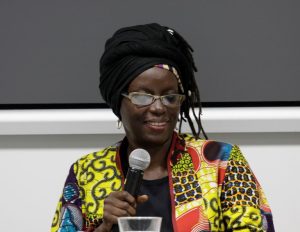
By Sylvia Tamale
Introduction
As most of us know, Sexuality is one of the most complex and politicized issues on the African continent. If Sexuality were to look in the mirror, she would see numerous faces. In these brief notes, I map out ten different “faces” of sexuality as they have been manifested in Uganda, analyzing their intersections with human rights plus the de jure and de facto rules and norms that mould and paint their features.
- The Erotic Face
Wearing the shroud of silence and mystery, the face of Sexuality that most of us wish to focus on is the one that exhibits erotic desire and pleasure. Most Ugandans would wish—if not openly, at least secretly in their deepest fantasies—that they were free to express their sexuality freely and derive maximum pleasure from it—provided those expressions and activities involve willing adult participants. Alas, there is the legal face that squints at the erotic one, with significant implications for our right to desire, our right to pleasure, and of course, our right to love…
- The Legal Face
The powerful legal face of sexuality wears bold rules, restrictions, regulations and prohibitions on how, where and with whom we “do” sexuality. The face would be attractive if the rules were confined to punishing those who inflict harm through sexual exploitation, assault and violence. But they go beyond that—sometimes being patronising, at others controlling and at other points, even sexist. In the process, these restrictions step on our rights to privacy, non-discrimination, autonomy, integrity and dignity. Examples of such laws abound, including those on prostitution, criminal adultery, homosexuality, marital rape, pornography and abortion. But, like a double edged sword, this face cuts on both sides and often its other face has been deployed by marginalized groups in Uganda to challenge its restrictive twin face. Through strategic litigation, some of the stubbles and freckles on the restrictive legal face have been rendered unconstitutional. For example, in a case filed by an NGO called Law and Advocacy for Women in Uganda (LAW-U), criminal adultery that targeted wives and not husbands was declared unconstitutional in 2010.
- The Reproductive Face
This brings me to the next face of sexuality, whose forehead wears the script of the roles of women and men in the continuity of life. That is the face of reproduction which speaks both the language of health and the language of human rights. The forehead is creased by restrictive abortion laws, and the mouth is contorted with practices which proscribe contraception. The well-being of this face is further affected by underdevelopment and the lack of political commitment to its agenda. In Uganda, the eyes of the reproductive face are generally closed most of the time or at best squinted. While therapeutic abortion is legally permitted, the access to such a procedure remains a huge challenge, rendered more confusing by government policies that are more accommodating than the law.
- The Violent Face
The violent face of sexuality is angry and has a permanent snarl. It is smeared with thick layers of damage and often recoils in utter stigmatised shame. The violent face is typically feminine, with a lingering look of sadness that stems from loathing control. It cannot escape the hurt in public or private spaces; in offices, schools, communities and homes; from acquaintances, from family members, from trusted individuals and from strangers alike. It is a face we see both in times of peace and in situations of conflict. This face is the ultimate persona of gender domination and it is a face acutely aware of infringements of the rights to sexual autonomy and bodily integrity. Currently, the Ugandan laws that would potentially save its life are ineffective as they are coded through a patriarchal, phallocentric culture. Sadly, a bill that was devised to improve the situation has been collecting dust in the corridors of power since the year 2000.
- The Cultural Face
The cultural persona of sexuality is also double faced, exhibiting both positive and negative aspects. The positive side shows African traditional values that enhance sexual pleasure while the negative side exhibits practices geared to the control of women’s sexuality. In that sense this face both enhances and violates human rights. In Uganda the traditional institution of Ssenga among the Baganda, for instance, plays a significant role in promoting the right to sexual pleasure on the one hand, but on the other, despite the outlawing of the cultural practice of female genital mutilation, it is still practiced by some communities in the country.
- The Heteronormative Face
The heteronormative face of sexuality has big beautiful eyes that are deceptive because they hide a serious disability, that is, the fact that their central vision is exclusively binary. This visual impairment means that she tends to categorize people in absolute terms as either heterosexual male or heterosexual female. When the optometrist prescribed human rights lenses that would enable this face to clearly see diversity, the legal, cultural and religious faces conspired to conceal the prescription from her. In Uganda, not only do these conspiratorial faces possess powerful platforms to promote the heteronormative ideal, stoking hatred and violence at every turn with homophobic and transphobic rhetoric; they also attempt to obliterate the rich diversity of Ugandan faces, particularly the homosexual and bisexual ones. The draconian Anti-Homosexuality Act, which was invalidated by the Constitutional Court in 2014, was the latest attempt to reinforce legal support for this face.
- The HIV Face
From a distance, you can only see the epidemiological side of the HIV face. However, on closer scrutiny you will notice the unmistakable gender and power wrinkle marks as well as the oppressive furrows of social class. Access to the cheap affordable generic cream that the dermatologist recommended is becoming more and more difficult in the face of international intellectual property protections. As if that’s not bad enough, last year, the Ugandan government passed the HIV and AIDS Prevention and Control Act (HAPCA), criminalising the sexual life and activities of this face. The irony is that such a law that purports to be based on human rights principles in fact tramples human rights. The socio-economic and cultural sides of this face clearly expose the complex dynamics between gender, human rights and HIV. Not only does HAPCA contravene the Constitution and national policies on HIV/AIDS but it also violates several rights enshrined in international human rights treaties that the country has committed to.
- The Political Face
The contours of the political face of sexuality serve a specific socio-political purpose of outlining the criteria of sexual citizenship. It is tinged with hypocritical rhetoric that wears the mask of “preserving traditional family values” “protecting our children” and “maintaining morality.” It has the tendency to press panic buttons, to ahistoricize and otherize faces of other sexualities and to appeal to populist sentiments. For example, the Anti-Pornography Act that was passed by the Ugandan government in 2014 emboldened vigilante groups and abusive government officials alike to maltreat women, including publicly undressing them. In short, this face instrumentalizes sexuality for political ends and in the process, disenfranchises and inflicts untold damage to diverse minority groups in Uganda. The political face, which is a close ally of the religious and cultural faces, usually rears its ugly head covered in partisan feuds, sectarian hatred, ageism, neoliberalism, patriarchy and militarism.
- The Religious Face
Closely resembling the political face is the religious one. The message on this face tells us that sex that is non-genital, non-procreative, outside marriage, and between same-sex individuals, is sinful. Its personality is heavily influenced by the Natural Law moral principle that makes it particularly attractive to the legal face. But sexual morality is deployed based on double standards for men and women. Examples of such laws include laws that govern criminal adultery and prostitution. In Uganda, for instance, the offence of prostitution criminalizes sellers of sex (majority being women) without touching the buyers (most of whom are men). Legal positivism and feminist jurisprudence have heavily criticised this face for its moral-based sexual laws in favour of rights-based laws. In Uganda, this face is personified by Reverend Father Simon Lokodo, the Minister of Ethics and Integrity, who polices women’s sexualities with an iron hand. This face is also in constant political struggle with the next one…
- The Subversive Face
The subversive face of sexuality wears a permanent wink! It carries an undercurrent of rebellious, unrestrained sexuality. Often characterised by great creative skills, subversive sexuality consciously breaks sexual taboos and crosses bright red lines. It ignores norms and throws prejudice to the winds; it is not afraid to use four-letter words and to relish in the embarrassment that it causes, while knowing that what it is doing is exposing the innate hypocrisies of human beings: “F-them!” it tells the world, and knows that secretly, the world actually agrees.
This face organizes and plots in radical ways, constructs counter-“truths” about its realities, in an attempt to topple the lies peddled about its persona. But the subversive face does all this at a huge price of swift and fierce backlash from the legal, political, religious, heteronormative and violent faces. These faces gang up against her to squash all her sexual rights. In fact they are not satisfied with simply plotting, but try to completely efface her image. And the tools used range from acid to the sharp knife of the traditional genital surgeon. Established in October 2009, the Civil Society Coalition on Human Rights and Constitutional Law is the most visible side of this face in Uganda, although the whole alphabet movement of sexual minorities (LGBTI), and of sex workers is really at the forefront in leading the way in this regard.
Conclusion
The diagnosis is simple: Sexuality suffers from a chronic case of schizophrenia! The prognosis is not good. Most of the time her condition inflicts huge human rights costs. It causes profound disruption not only in her life but also in the lives of Ugandans who come face to face with her. The prescription for stabilizing sexuality is to place her in a state of induced comatosia before undergoing major surgery that will provide her with a completely fresh and clean face. The new face will be constructed from unblemished diverse threads of human rights and social solidarity that weave a complex web of justice, tolerance, equality, integrity, dignity, liberty and autonomy, safety, free choice, access to health services and most importantly to pleasure. It will reflect the true complex social nature of sexuality. But the challenge is a daunting one. The fresh, reconstructed face must not be viewed as the end of the struggle; rather, as only one battle that will have to be joined by many kin, neighbors and acquaintances of sexuality.
About the Author
Sylvia Tamale is a Ugandan academic and the first woman dean in the Law Faculty at Makerere University. She is the recipient of the Ford Foundation Fellowship, Fulbright-MacArthur Scholarship, University of Minnesota Award for International Distinguished Leadership and the Akina Mmama Wa Afrika Award for human rights activism in Uganda.




